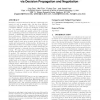Free Online Productivity Tools
i2Speak
i2Symbol
i2OCR
iTex2Img
iWeb2Print
iWeb2Shot
i2Type
iPdf2Split
iPdf2Merge
i2Bopomofo
i2Arabic
i2Style
i2Image
i2PDF
iLatex2Rtf
Sci2ools
140
click to vote
KDD
2009
ACM
2009
ACM
Heterogeneous source consensus learning via decision propagation and negotiation
Nowadays, enormous amounts of data are continuously generated not only in massive scale, but also from different, sometimes conflicting, views. Therefore, it is important to consolidate different concepts for intelligent decision making. For example, to predict the research areas of some people, the best results are usually achieved by combining and consolidating predictions obtained from the publication network, co-authorship network and the textual content of their publications. Multiple supervised and unsupervised hypotheses can be drawn from these information sources, and negotiating their differences and consolidating decisions usually yields a much more accurate model due to the diversity and heterogeneity of these models. In this paper, we address the problem of "consensus learning" among competing hypotheses, which either rely on outside knowledge (supervised learning) or internal structure (unsupervised clustering). We argue that consensus learning is an NP-hard pro...
| Added | 25 Nov 2009 |
| Updated | 25 Nov 2009 |
| Type | Conference |
| Year | 2009 |
| Where | KDD |
| Authors | Jing Gao, Wei Fan, Yizhou Sun, Jiawei Han |
Comments (0)

